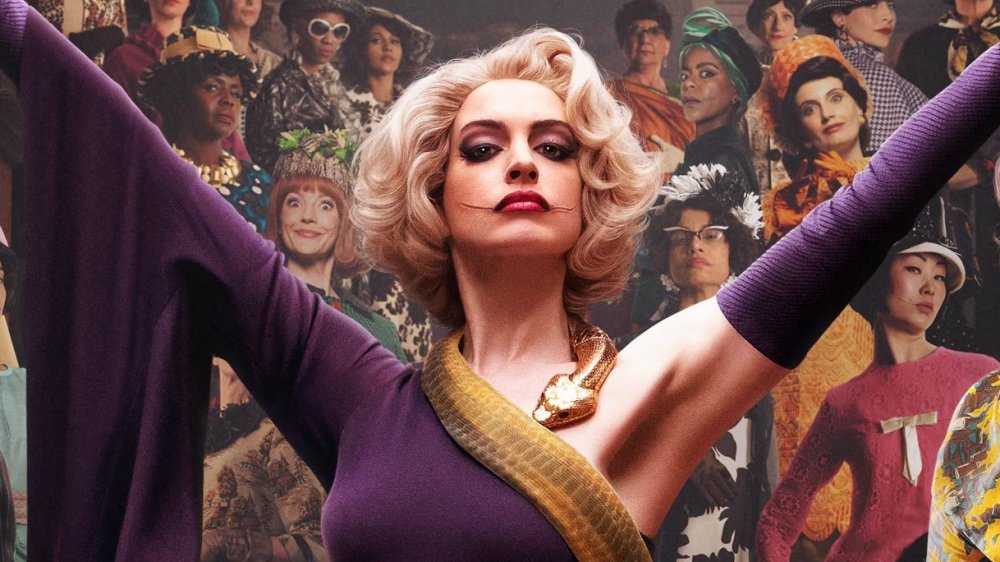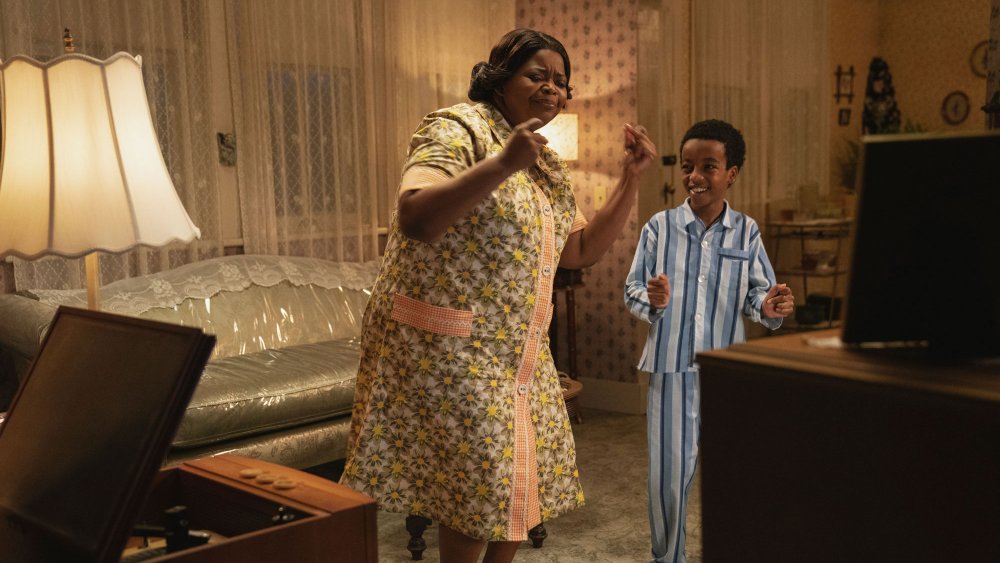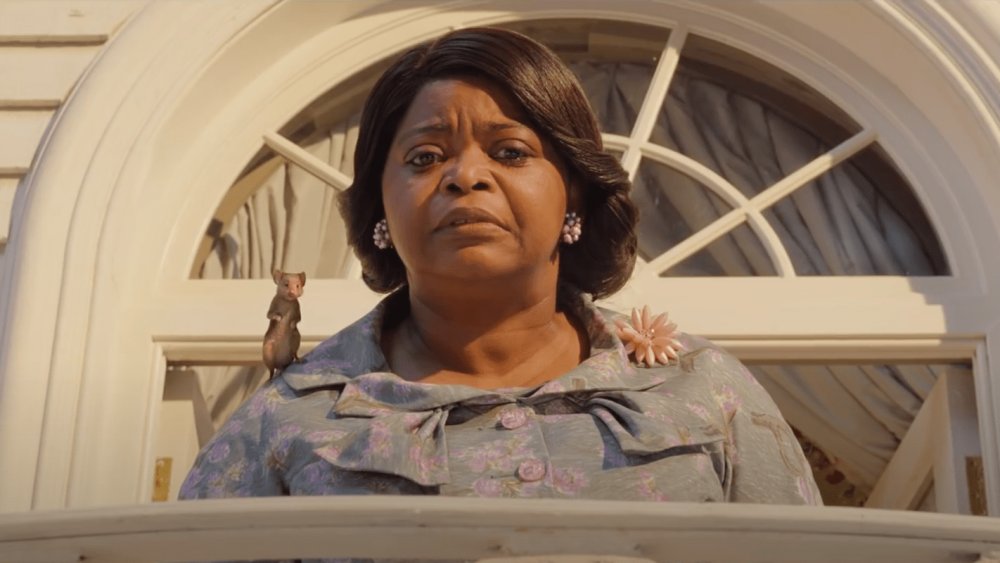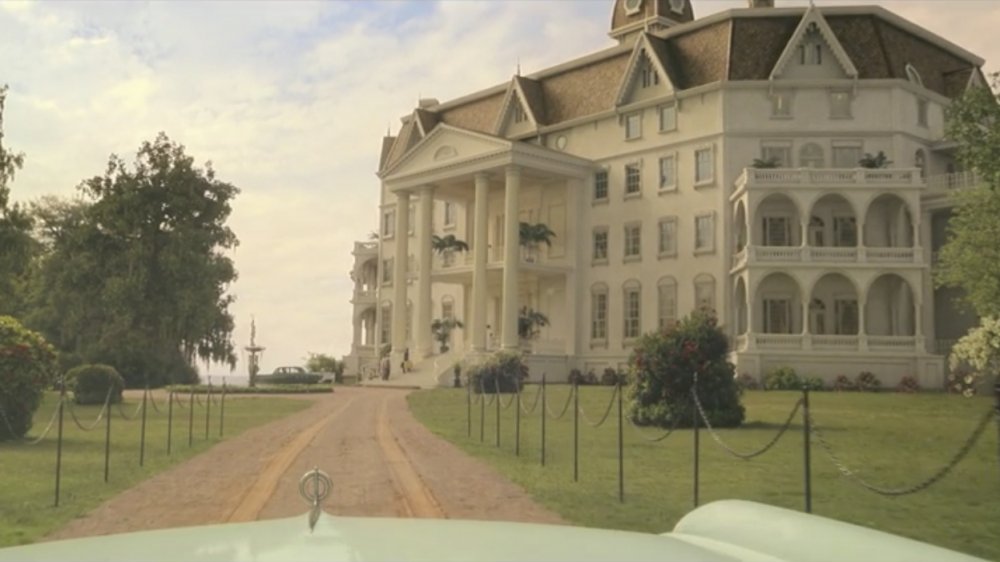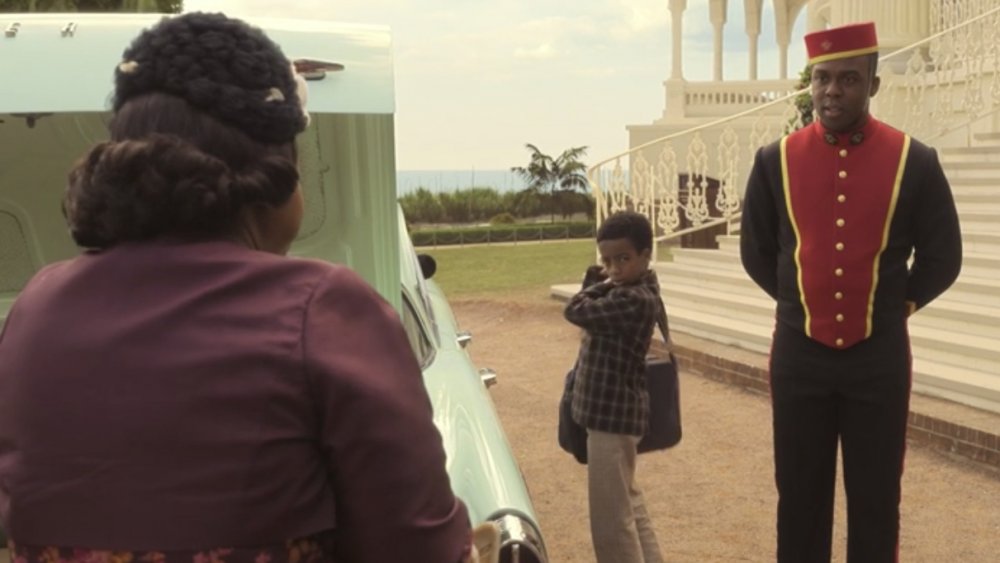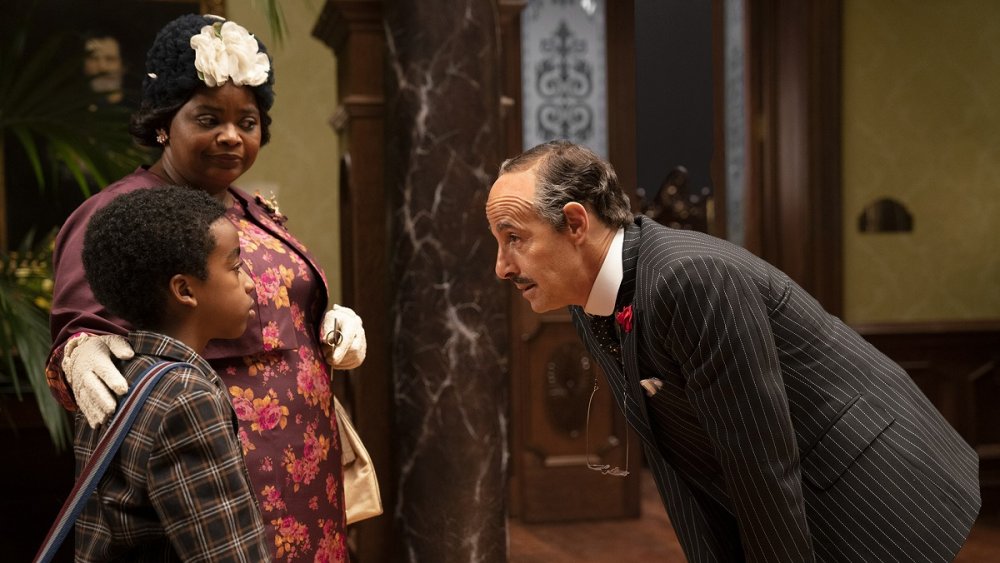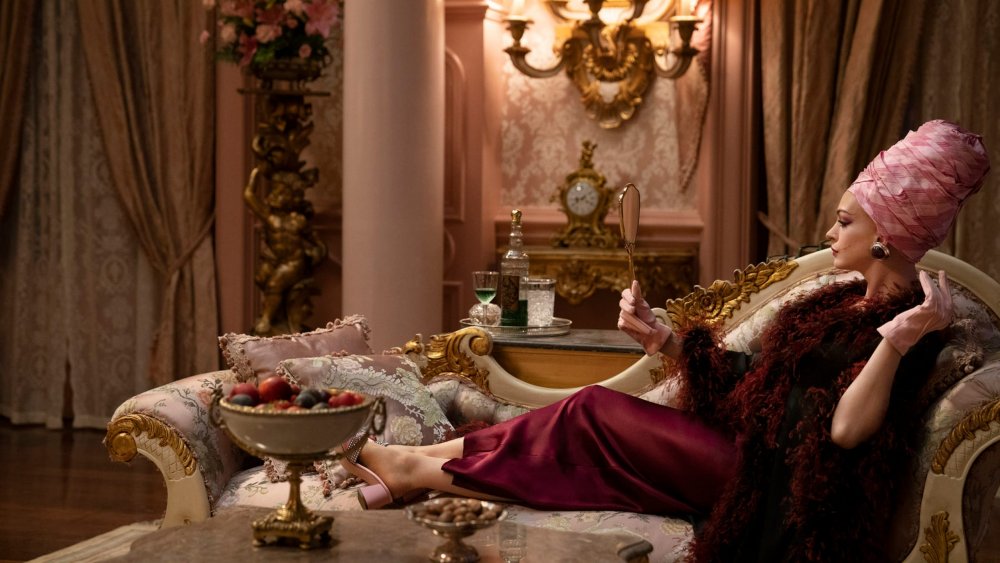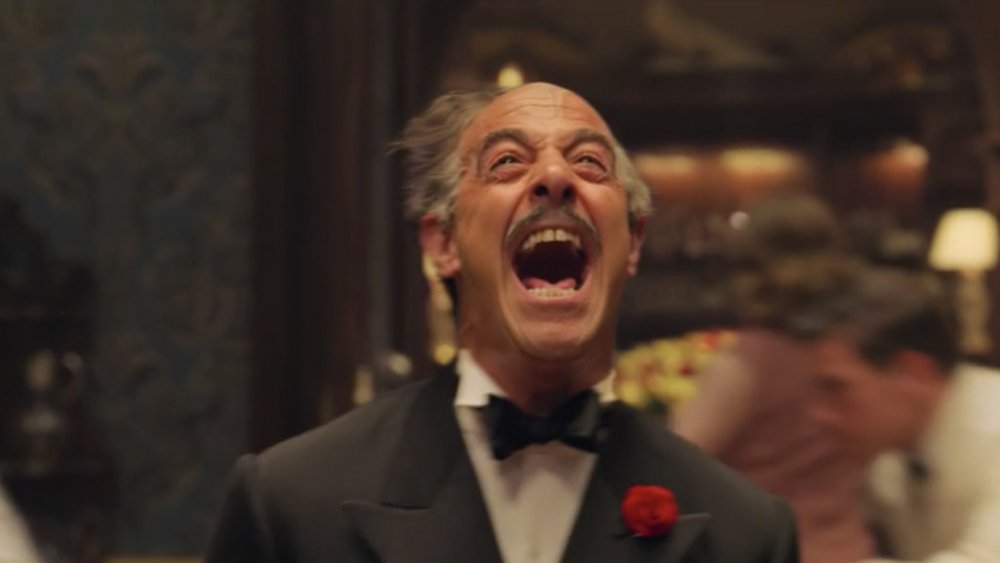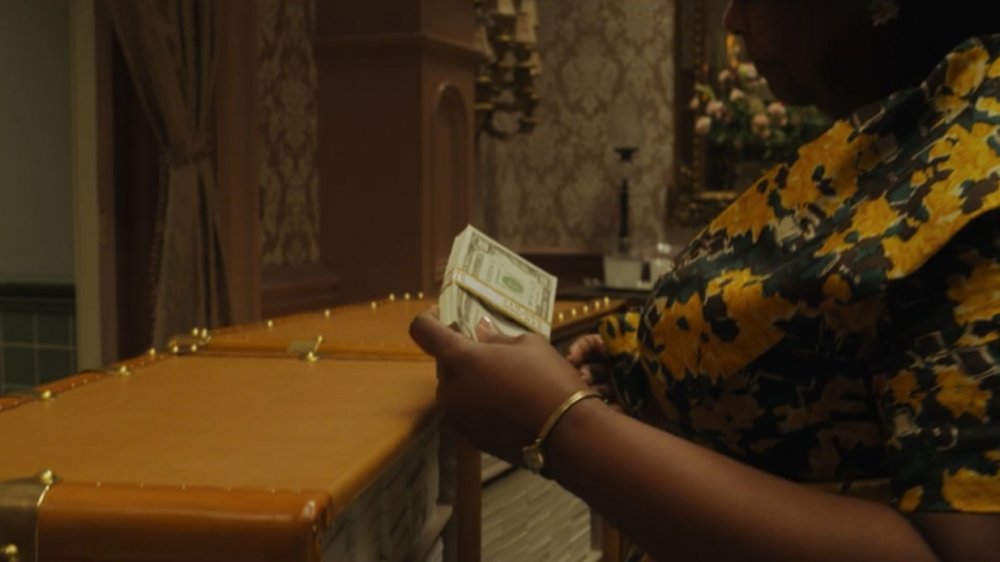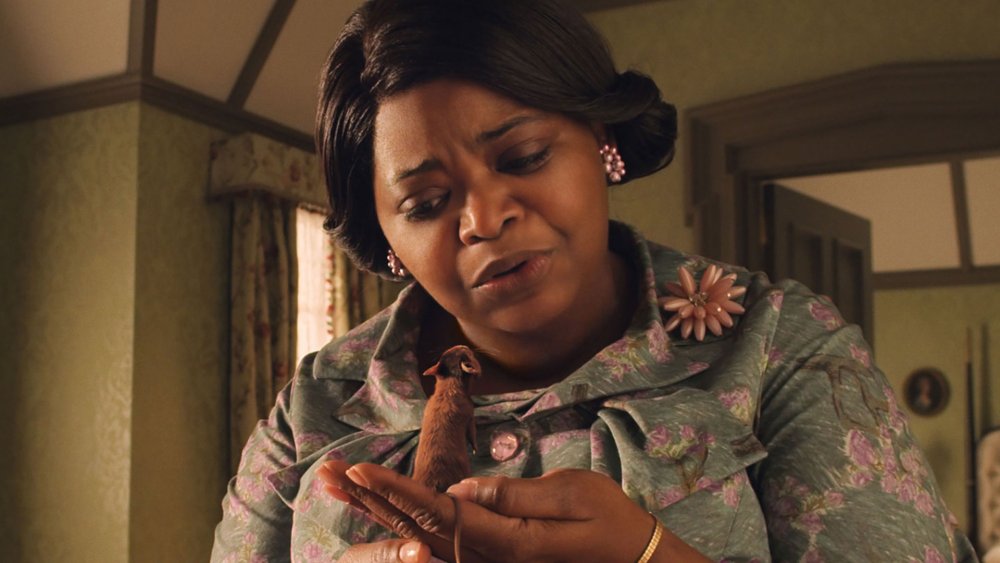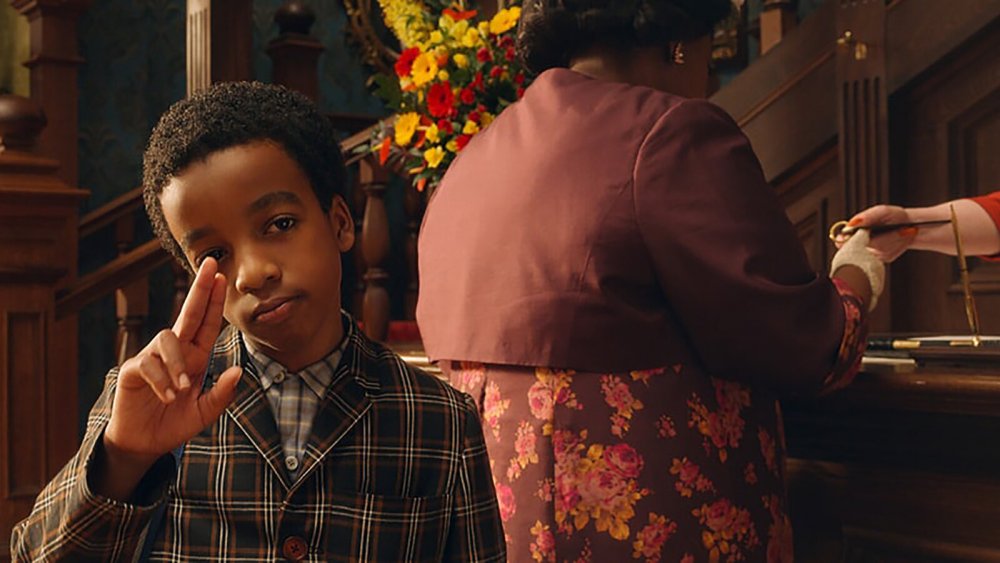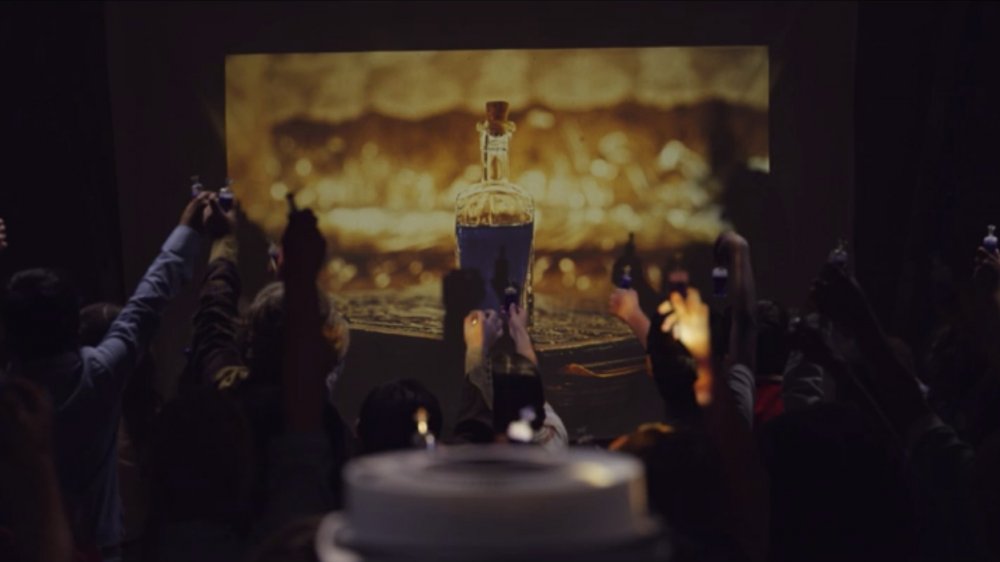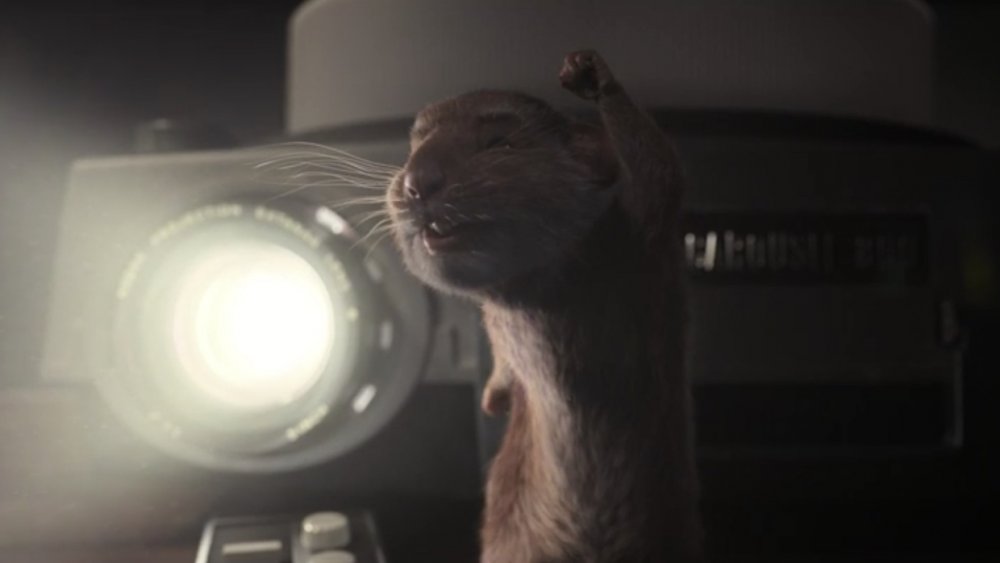Things Only Adults Notice In The Witches
The latest big-screen adaptation of Roald Dahl's beloved children's book, The Witches, makes a number of significant changes to the source material. Principally, a major new character is added, and the setting of the tale is shifted from an unspecified year in England and Norway to the American South of the late 1960s. Additionally, although the book never grants the protagonist an explicit physical description (or even a name), it's probably safe to assume that Dahl was not envisioning a Black family when he wrote his English-Norwegian characters.
Young fans easily notice these changes, but there are a number of other elements of the 2020 film that go right over their heads. These details stand out clearly to their parents and caregivers, however. From pointed, modern-day social commentary, to the dark implications of the movie's macabre ending, here are some of the things only adults will notice in The Witches.
The Witches is set during a tumultuous time
Our hero, who is unnamed in the book but identified as Charlie in the 2020 film, begins his tale in the last month of 1968. For children, this amounts to nebulous olden times — but adults should recognize that 1968 was a year with a lot of historical significance for the American civil rights movement. This historical struggle is not present in the book, but became relevant to the story of The Witches the instant the decision was made to set the movie in the American South, centered around Black characters.
What events marked 1968? On April 4, 1968, civil rights leader Martin Luther King Jr. was assassinated. In response to the grief and outrage sparked by his death, riots broke out, placing more pressure than ever on the Johnson administration to enact change. Mere days after the assassination, on April 11, the Fair Housing Act was passed, which prevents housing discrimination on the basis of race, sex, national origin, and religion. While The Witches never explicitly engages with these events, beginning the tale in late 1968 adds a new layer of complexity and tension to the tale.
There's probably a lot more to Grandma's story
In both the book and the film, Charlie (Jahzir Kadeem Bruno) learns everything he knows about witches from his Grandma (Octavia Spencer). However, the movie never explains how Grandma came to be quite so knowledgeable about witches. All she tells Charlie is that she saw her friend Alice transform into a chicken when she was a child, after accepting a piece of candy from a strange lady she later learned was the Grand High Witch (Anne Hathaway).
But that encounter didn't teach Grandma that witches are bald under their wigs and hats, that they have claws and a heightened sense of smell, and that they lack toes. Moreover, the entire reason she and Charlie pack up and head to the hotel where most of the story takes place is because Grandma insists that once a witch sets her sights on a child, she'll never give up looking for them. How did she learn these details? Furthermore, even though Grandma saw the Grand High Witch as a young child, she doesn't appear to be living in fear of her. Why didn't the Grand High Witch pursue her? Did Grandma manage to repel her somehow? The movie never gives us answers to these questions, but whatever they are, we're sure they speak to a very interesting backstory for Grandma.
The Grand Orleans Imperial Island Hotel is a subtle nod to America's dark past
When Grandma realizes that a witch is after her grandson, she calls in a favor with her cousin, who spent three decades as the executive chef at the Grand Orleans Imperial Island Hotel. It is, according to Grandma, "the swankiest hotel in all of Alabama." She then goes on to explain to Charlie that the clientele of the Grand Orleans Imperial Island Hotel is "nothing but rich white folks," assuring him that they'll be safe because "witches only prey on the poor, the overlooked, the kids they think nobody's going to make a fuss about if they go missing."
Once they arrive at the hotel, Grandma's words take on additional meaning. The Grand Orleans Imperial Island Hotel isn't a real place, but there's no mistaking that it's meant to resemble a converted plantation home. This immediately calls to mind America's horrific history of slavery, which forced Black people to work for "rich white folks" and endure endless abuse, enabled, in large part, by "[nobody making] a fuss." It's a parallel children might not catch, but adults absolutely will.
There's a reason Grandma tips well
All members of the hotel staff seen in The Witches are Black, while the guests (with the exception of Grandma and Charlie) are white. When Grandma first pulls up in front of the hotel, the bellhop is initially confused about why she's there, and is surprised when she says she's there as a guest. Once he realizes she's serious, he seems delighted and refuses a tip as he takes her bags. This dynamic might go over little heads, but grown-ups will grasp its significance.
Later, once Grandma has taken the Grand High Witch's case full of money, she makes a point of giving every member of the hotel staff a $100 tip on her way out the door. For adults who understand the power dynamics that would have been at play between Black and white individuals in 1968's Alabama, Grandma's generosity is a kindness as much as it is a triumph. There's a camaraderie between Grandma and the staff other guests don't have, and their actions toward each other at the beginning and end of the film communicate an unspoken acknowledgement of it. Despite being on opposite sides of the hotel hierarchy, they're all part of the same community.
The exchange between Grandma and the hotel manager isn't as polite as it appears
After Grandma receives the key to her room, the hotel manager (Stanley Tucci) spots her and gets a suspicious look in his eye. Once he learns who she is, his expression clears — but even then, he attempts to put her down. First, he holds her key away from her while prattling on about her room, ignoring her coughing fit. He then leans down to tell Charlie how "lucky ... a young gentleman such as [himself]" is, to be able to stay in the hotel.
Adults won't miss the unmistakable racial tension and power dynamics at play in this scene. First of all, if Grandma had been white, the manager likely wouldn't have given her presence in the lobby a second thought. And even though he smiles throughout their encounter, his actions and language convey that he is making sure Grandma knows that he is the one in control of the situation, and that she and Charlie should feel grateful to be allowed in at all. It's a superficially benign encounter with a very ugly undercurrent. In addition to the real-world bigotry present in this moment, it's also loaded with ironic tension, since the actual people who shouldn't be allowed into the hotel are greeted warmly by the manager in the very next scene.
The Grand High Witch's room number has spiritual significance
When Grandma and Charlie check into their room, they're told it's room 766, which turns out to be directly above the Grand High Witch's suite in 666. But the room numbers have more significance than just their locations within the hotel. In the Bible, 666 is a number associated with the Antichrist in the Book of Revelation, which certainly adds some additional meaning to Grandma's explanation that witches are "demons."
While there's not much other religious subtext in The Witches, the room number assigned to the Grand High Witch is certainly meant to raise an eyebrow with adults, driving home that Hathaway's character is indeed meant to be an ultimate embodiment of evil. It's a pretty dark reference to make in a film targeted toward children, but unless the youths watching the film are particularly well versed in the apocalyptic literature of the Bible, they're not likely to think of the Grand High Witch's room assignment as anything more than just a number.
The ending of The Witches can't be good for business
After being turned into a mouse alongside his friend Bruno (Codie-Lei Eastick), Charlie hatches a plot with his Grandma to use the mouse-maker potion against the witches by putting it in their pea soup. Although the plan hits some bumps along the way, they ultimately pull it off, and dozens of witches get dramatically transformed into grotesque rats in the middle of dinner.
Despite seeing their guests transform into rodents, the hotel staff immediately sets about exterminating them. They chase them around the dining room with brooms, rolling pins, and cleavers in an attempt to quickly scrub out the infestation. Meanwhile, the hotel guests panic, with most running screaming from the dining room. Although the audience knows that the rats are actually witches, and that the sudden presence of vermin in the dining room isn't due to any negligence on the part of the hotel, other guests have no way of knowing that. Combined with the inevitable news that an entire group using the hotel's convention facilities went missing, the story of an out-of-control rat infestation at the hotel will likely lead to a steep decline in business — if the hotel isn't shut down entirely.
The Grand High Witch's money is never explained
The Grand High Witch has a trunk full of crisp $100 bills in her room. Her assurance to the other witches that they don't have to worry about money because she has it taken care of is readily accepted by her acolytes — of course she's got piles of cash, they seem to think, she's the Grand High Witch! She's got her ways!
However, adults in the audience may wonder exactly what those ways are, since her responding to the fiscal worries of the other witches reveals that witches can't actually just conjure money out of thin air. The film implies that the Grand High Witch doesn't age, as evidenced by Grandma's encounter with her as a child, so it's possible she's just been a scrupulous saver all these years. Her decision to go with whichever soup is cheapest for dinner certainly nods to a sense of frugality (although if she really is such a penny-pincher, one has to wonder why she booked the witches' gathering in such a fancy hotel). But those bills seem a little too fresh to represent years worth of savings, or even a large cash withdrawal from the bank. Is it counterfeit? Did she steal it? Did she create it using ultra-rare magic? And perhaps most importantly, are those bills traceable, and will Grandma using the money draw the attention of law enforcement?
Grandma and Bruno's parents will have some explaining to do
From the outside world's perspective, both Bruno's parents and Grandma go on vacation with their children, then come back without them. What's more, neither is likely to file a missing persons report, since the Jenkins clan knows exactly where their son is, but choose not to accept him as a mouse, while Grandma still has Charlie with her, along with Bruno. Both Grandma and the Jenkins family will probably proceed with life as usual, sans children — but this is bound to raise some questions, once others realize the kids are missing.
From Charlie's point of view, he and his Grandma end the film about to begin traveling the world, in order to hunt down witches. That might only be part of the truth, however. It's possible that Grandma knows the authorities may eventually start wondering what happened to Charlie — especially since she gained custody of him so soon before he disappeared — and that while the two of them are indeed really hunting witches together, they're also on the lam. Grandma could try explaining what happened, but it's not likely anyone would believe her ... especially given the fact that this escapade also saw her gain a sudden windfall of cash.
The narrator's happy ending is really pretty sad
While Grandma says that a typical mouse's life span is only around three years, she estimates that Charlie will have longer, since he's a boy turned into a mouse through magic. He might even have up to three times a typical mouse's lifespan, giving him nine more years. Charlie is overjoyed, exclaiming that he and his grandmother can die at the same time, so neither of them ever has to be alone.
While this logic may make sense to kids, most adults will instantly pick up on the fact that this news isn't nearly as exciting to Grandma as it is to Charlie. Her expression is familiar to anyone who has ever struggled to keep up a happy face while inwardly grieving. Not only has Grandma lost her daughter in the car accident that killed Charlie's parents, but now she has to come to terms with the reality that her grandson isn't likely to even reach his 20th birthday. That may be a long life for a mouse, but it's tragically short for a human, and Grandma is probably heartbroken that her last remaining descendant will never get to lead the long life she'd envisioned for him.
Where did all those children come from?
The Witches ends with an older version of Charlie teaching a group of child recruits about witches. However, it's never explained where these kids come from, where their parents are, or how they'll be able to travel all over the world hunting witches. It's also hard to tell exactly where Charlie's giving his slide presentation, but it doesn't appear to be a school auditorium or gymnasium, which rules out some of the very few places it might be reasonable for Charlie and Grandma to have access to a large group of children. Although even if that were case, one would have to wonder where all the teachers are.
It seems most likely that they're in some sort of basement or bunker — but in that case, how did they round up enough children to fill it? Are they out at playgrounds recruiting kids to their cause? Are they involving their parents at all, or did all these kids sneak out of their homes in order to attend Charlie's presentation on witch-hunting? And perhaps most bafflingly, how are these kids supposed to travel internationally in order to track down every witch in the world and turn them into mice? Charlie acts as though sending children out as international assassins is a totally reasonable thing to do, but we have more than a few questions about who these kids are, and how they're going to pull it off.
The ending plan is a little alarming
Putting aside the logistics of Charlie's international, child-led, mass-assassination plan, all of the kids involved are being sent out into the world to battle supernatural creatures to the death. Sure, they're armed with magic potions — but if any of their plans go even slightly wrong, the witches will swoop in to kill them, and will very likely succeed.
Young viewers watching the film aren't likely to pick up on the potentially horrific implications of sending out swarms of children to engage in clandestine life-or-death combat with superpowered cannibals, but adults surely will. Even assuming an overwhelmingly high success rate — which doesn't seem likely, considering how many hiccups Charlie's own plan hit along the way — it's probable that at least a few of these children will get caught, and subsequently eaten. Either Charlie doesn't realize this — he is, after all, just a teenager — or he thinks a few kids' lives are a reasonable price to pay to achieve his goals. Yikes.
